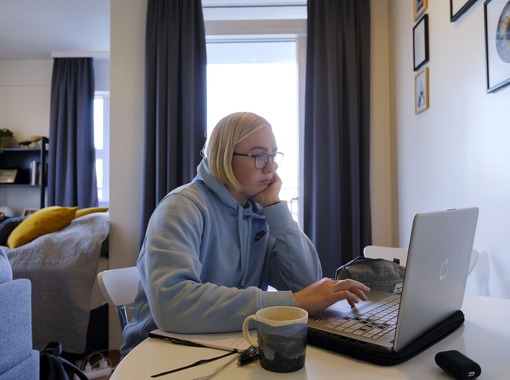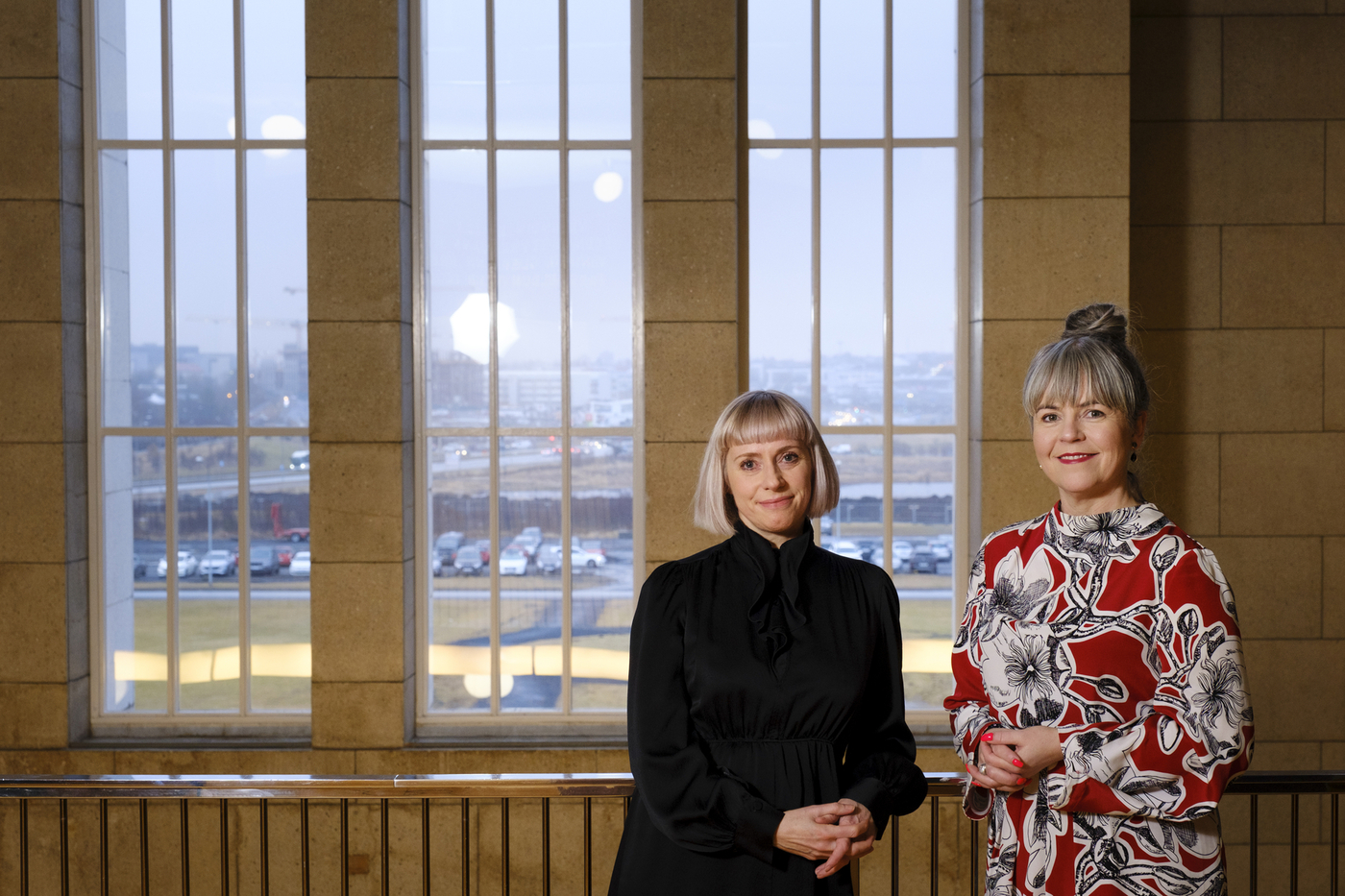"Pedagogical development is a never ending project. New research is emerging all the time and there are constant and rapid changes in our society. Teaching and learning need to keep up with those changes," explains Hólmfríður Árnadóttir, who was recently appointed distance learning coordinator at the University of Iceland. Her duties include following up the University's strategy for enhancing digital teaching and increasing the number of study programmes that are available for distance learners. According to Steinunn Gestsdóttir, pro-rector for academic affairs and development, the University must prioritise clear quality standards and effective design, working together with people within and outside the University.
The Strategy of the University of Iceland, UI26, places clear emphasis on the continuous development of teaching methods and course offerings, as well as the use of digital technology to enhance teaching methods, improve communication and meet the different needs of students, with regard to residence or disability. "Distance learning has been much discussed in recent years, especially from the perspective of equality. There are many benefits to distance learning. It makes education easier to access for people outside the capital and people who are less able to travel due to illness, injury or disability," says Hólmfríður.
Distance learning reduces travel and thereby pollution and road traffic accidents, so in a sense it is also good for the environment as well as saving time. "With distance learning, we can reach a more diverse group of students," adds Steinunn, though she stresses how important it is for distance students to feel that they belong to the University community. "The University of Iceland is leading the way when it comes to offering diverse routes to higher education. I believe that we have the most vibrant university community in Iceland. The University of Iceland also works systematically to accommodate the different needs of students. We offer a wide range of options for continuing education and lifelong learning, professional education programmes for students who do not meet standard admission requirements, learning for students with developmental disabilities, and special support to help students from immigrant backgrounds access higher education. In recent years, our attentions have been focused on distance learning. We have been developing the technical infrastructure and offering greater support to instructors and faculties to help them successfully design distance studies."
Although there is a long-standing tradition of distance learning at the University of Iceland, the COVID-19 pandemic helped more instructors and students see the positive sides. "Although a lot of the distance learning that took place at that time, which has been called emergency distance learning, was not necessarily high quality in terms of the pedagogy, it did lead to more dialogue on the technology and tools and theoretical foundation. It opened many people's eyes to the benefits and opportunities," explains Hólmfríður. She adds that distance learning can also help to strengthen study programmes that are struggling and to meet the needs of a rapidly changing society.
Almost 600 courses already available via distance learning
For many years, the UI Centre for Teaching and Learning has provided support for instructors who want to offer distance learning, but further improvements are planned in this area. There will be a clear focus on quality standards for distance learning, development of infrastructure, and not least increasing the number of distance study programmes, with robust support available for faculties who want to go down this path.
Hólmfríður says that when distance learning at the University was mapped, she was pleasantly surprised to discover that a wide range of programmes already offer distance learning and have done so since long before the emergency measures of the pandemic. "There are already almost 600 courses available via distance learning at the University. The School of Education, for example, has a very long tradition of distance learning," she points out.
A survey was recently conducted among the UI schools, asking about interest in expanding distance learning. As a result of that survey, the plan is now to develop entire study programmes for distance learning. "Some of these programmes will be launched next autumn and in some cases programmes already offer some form of distance learning. But we plan to review and develop them further based on the pedagogical principles, as well as gradually expanding course offerings for distance learning within faculties," says Hólmfríður, explaining that more distance study programmes will be added over the next semesters and years.
There are two main kinds of distance learning:
- Traditional distance learning, which mostly takes place online, but students are expected to participate in real time at online meetings and/or on-site sessions.
- Online learning, a kind of distance learning which takes place entirely online with no attendance required, but within a specific framework in the same way as a traditional study programme.

Entire study programmes for distance learners
Four of the programme currently being developed are diploma programmes at the School of Humanities – in French, German and Spanish. "It is really exciting that we will soon be able to offer language learning for everyone across the country, opening up opportunities for people who want to work at embassies or use a language abroad or teachers who could then teach that language," says Hólmfríður.
In the social sciences, there are plans to review two distance study programmes, in information science and sociology. Museum studies has also been offered as distance learning for many years. "The idea is to think about the big picture and entire programmes, which means a lot of work and the involvement of many people. We want to do this to a high standard and ensure that the distance learning we offer is of outstanding quality. People are genuinely motivated to work hard and realise this vision, so it's an exciting time," she says.
"We aim to improve our expertise and collaborate more with other universities in Iceland and abroad to enhance the quality of distance learning and course offerings at UI. But we are taking care to do this properly, in line with the pedagogy and academics who have demonstrated success and identified realistic solutions," adds Steinunn.
Hólmfríður, along with students at the University, is learning a lot through this process, picking up new knowledge of the pedagogy of distance learning. "Pedagogy is my specialism of course, but on top of that you have to think about the integration of technology and the fact that when the instructor isn't in the same room, you need another way to keep the students engaged in the material and the assignments they've been set," explains Hólmfríður, who is actually a distant student herself, studying the design of distance learning at the University of Oxford.
Great interest in distance learning at UI
The review of distance learning will take place in collaboration with external experts who have experience of distance learning, both as researchers and instructors. They will provide workshops on distance learning design for key personnel in all UI schools.
"It's been a particularly interesting time and I've been well received. By that I mean that there is a lot of interest in distance learning and interest in building those skills at the University. Since UI is the biggest university in Iceland, offering the widest range of study programmes, it is important that we offer diverse ways to access education," says Hólmfríður, adding that emphasis will be placed on informing prospective students of the available distance learning options.
But would it be possible to offer all programmes as distance learning? "That's a big question! It actually might be – distance learning with good on-site sessions for practical learning where necessary, but otherwise remote meetings or completely online learning. But that is not our goal. The University of Iceland is a strong campus university and we certainly don't intend to undermine that. Our goal is that every school will offer some distance study programmes, with the focus on quality, academic standards and professionalism," says Steinunn.




